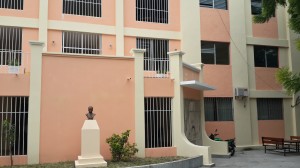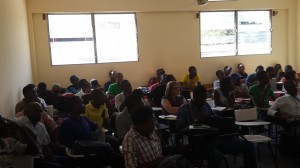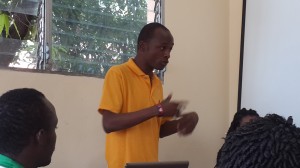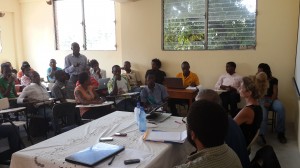IDG Interview: Dr. Jhon Picard Byron of Université d’État d’Haïti

The Wenner-Gren Foundation is pleased to announce the latest institution to receive the Institutional Development Grant, which supports the growth and development of anthropological doctoral programs in countries where the discipline is under-represented. To attain their goals, the Université d’État d’Haïti (UEH) will be partnering with scholars at the University of Kansas, Teachers College (Columbia University) and other anthropologists from around the world. We spoke to Dr. Jhon Picard Byron, director of the Department of Anthropology and Sociology in the Faculty of Ethnology, UEH, to learn more about his background, his department, and the state of the discipline in his country.
First can you tell us a bit about yourself and how you came to be interested in anthropology?
When I finished my coursework at the l’Ecole Normale Supérieure in 1996, I wanted to work on the ideas of 1946. That year marks an important moment of the 20th century in Haiti, the height of the ideology of Noirism with a movement that removed President Élie Lescot from power and led to the inauguration of President Dumarsais Estimé. I was not able to start this work on the thought that founded the movement of 1946. But, my thinking about that brought me to research the great Haitian thinker Jean Price-Mars, whose text Ainsi parla l’oncle, published in 1928, had a profound impact on subsequent Haitian thought.

My work on Price-Mars inspired me to work on all of Haitian Ethnography (for example, Lorimer Denis, Emmanuel C. Paul, Louis Mars, Jean-Baptiste Romain) and my interest for all foreign anthropologists who worked in Haiti (like Herskovits, Bastide and Métraux). For this, I use an approach that combines the history of thought, intellectual history, history of ideologies, and anthropology. Representation and political discourse are my broad research interests. So, I arrived in Ethnology through the history of the discipline and in the spirit of understanding a thinker who marked the 20th century with his scientific and political work.
I started my training in Haiti in Philosophy (Ecole Normale Supérieure, Université d’Etat d’Haïti, 1996). I obtained my bachelors and my masters in that discipline in France (Université Paris X, 2000; Université Nancy 2, 2001). I completed a master’s degree in political sociology as well (Université Paris 7, 2005). My doctoral dissertation was in Ethnology (Université Laval, 2012). I have been a lecturer at UEH since 2001 and have been teaching Political Philosophy since then, ethnology since 2010.
Who have been the anthropologists that have been most influential in your own personal formation and why?
I have a great debt to Michel-Rolph Trouillot, a Haitian-born anthropologist who taught at Johns Hopkins. He situated Price-Mars within the principle intellectual currents of the 20th century in Haiti, particularly the indigenists (noirists as well as Marxists). Professor Bogumil Jewsiewicki, a Canadian anthropologist who worked in the Congo/Zaire, also influenced me a lot. The ideas of Professor Jewsiewicki about the ‘pertinence of memory’ and of ideology in general, continue to inspire the work that I do.

Can you tell us a little about anthropology in Haiti? What are the pressing questions and concerns for the discipline there?
Since the 19th century, there have been Haitians who have conducted ethnographic work in the country. They gathered data and described the experiences and practices of Haitians. At that point, they began studying vodou. In 1941, they did establish the first institution of higher education where people could study anthropology. The Institute of Ethnology was similar to the institution established by Mauss and the other students of Durkheim in France in 1925. The Institute of Ethnology changed to become a Faculty in 1958 when Duvalier came to power.
The Haitian school of Ethnology lived dark days during the dictatorship. It still suffers the consequences of the serious institutional crisis that the country has experienced since the fall of Jean Claude Duvalier in 1986.
The struggle we have undertaken since 2012 at the Faculty of Ethnology is to bring about another renaissance in ethnology, similar to that of the period of effervescency and intellectual productivity that was alive in Haiti during the 1920s, 1930s, and 1940s.
Until then, anthropologists had produced research on Vodou, the peasantry, and culture in general. Now, they should work in other questions such as migration, economics, etc. Anthropology should help to determine the limitations to Haiti’s prosperity, and what positive factors can aid in its progress (democracy, social change, building social ties throughout society).
I think that there are many research questions that anthropologists in Haiti are concerned with. A first question is how to reorganize anthropology and separate it from sociology in a manner that would give it autonomy as a discipline within the social sciences. The second question is how to broaden anthropology to encompass all aspects of life in the country. The third question is how anthropology will be able to reflect on itself, and on its history. Such discussions in Haiti will contribute to the debates that have developed in contemporary anthropology since the 1980s. Overall, anthropology in Haiti needs to work on new objects and fields of inquiry and new theories.

Is anthropology a subject that attracts students in Haiti?
When I consider at the role anthropology can play in helping the country prosper, when we train anthropologists in this way, I believe that the Department of Anthropology in the School of Ethnology could attract more students. The department offers a curriculum that blends sociological and anthropological disciplines. In June 2013, 131 students completed the courses of the program in anthropology-sociology, but, from 2009 to 2013, fewer than 50 students obtained their bachelor after defending a bachelor’s dissertation. We will be able to increase the number of bachelor degrees when we expand these offers to four sub-disciplines of anthropology. That way, we can give students not only diplomas, but skills that subsequently can help them find work.
Can you tell us about your department, its specialties and how the award will help your department as it moves forward?
The Department of Anthropology and Sociology of the Faculty of Ethnology at the UEH is a department that offers a Bachelors of Science degree in Anthropology and Sociology. This year (2013-2014), the Faculty established a Masters program in social anthropology. In 2014, we began working to build a doctoral program in anthropology in conjunction with the Doctoral School of UEH.
The IDG will allow us to create a true Department of Anthropology in the Faculty of Ethnology that links with the four subdisciplines (biological anthropology, cultural anthropology, archeology and linguistics). Already, we have in this Department a bachelor’s and a master’s level in cultural anthropology. The overall vision includes a doctoral program that would develop alongside team-based research in a number of areas such as medical anthropology, economic anthropology, political anthropology, legal anthropology, and urban anthropology. We will strengthen the research in the Faculty especially that which is underway since 2012 with a team of the laboratory LADIREP (Language, Discourse, and Representations) working on a project called “Ethnology in Haiti: Writing the History of the Discipline to Support its Renewal”.